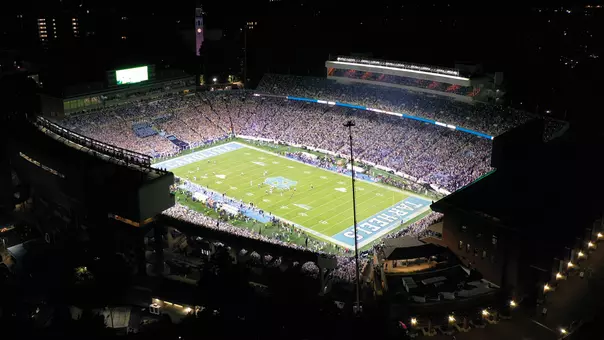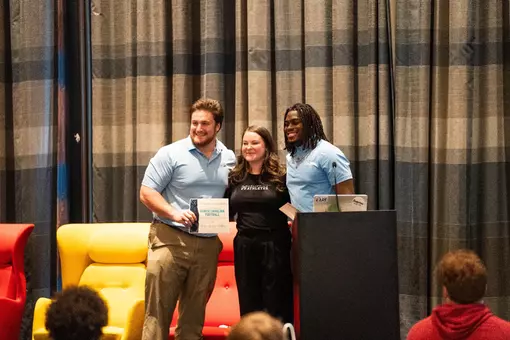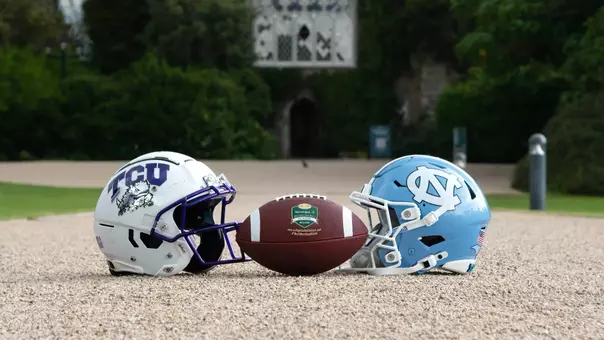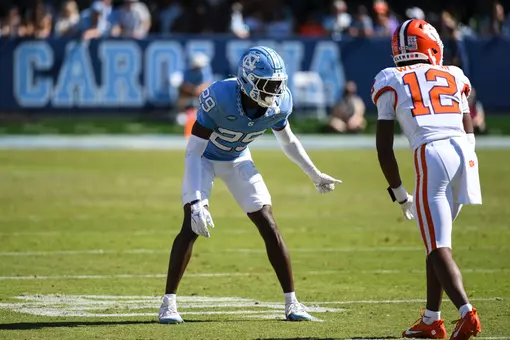University of North Carolina Athletics
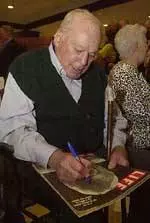
Charlie Justice Bio
October 17, 2003 | Football
Oct. 17, 2003
Charlie Justice was more than just a great football player. He was a bonafide superstar...a hero...a legend in his own time. He had an impact on his home state that no other athlete had ever had before or few have had since.
During his four years in Chapel Hill, from 1946 to 1949, Justice helped guide the Tar Heels to three major bowls. For one week during the 1948 season Carolina was ranked as the nation's No. 1 college football team. The Tar Heels ended that year rated third, the best finish in school history.
It is no wonder then he was held in great esteem by everyone in the state. Certainly, the time was right for a hero like Charlie Justice. World War II had just ended and people wanted to turn their attention to more pleasant things. They wanted someone to help them forget the trauma they had just suffered. So they looked for heroes and they found Charlie Justice.
In his book, They Made the Bell Tower Chime, Bob Quincy summed up Charlie Justice's college career quite succinctly. An excerpt is repeated here:
The Justice era of 1946-49 was the most exciting in Carolina's football history. Charlie was the ringleader of a circus of thrills. He set the pace, but his backing was superb.
The Tar Heels operated from the single wing with the kinds of variations that at times resembled the Harlem Globetrotters' pre-game ball-handling act. The four seasons netted 32 victories, seven losses and two deadlocks, plus three major bowl appearances.
The 170-pound Justice was one of the nation's most sought-after players when he enrolled at Carolina. Some called him the hottest property in the history of football at that time. He had been a standout at Asheville's Lee Edwards High, leading the Maroons to two unbeaten seasons. He was All-Southern two years at Asheville, and as a member of the Shrine Bowl football team in 1942 he scored three touchdowns against South Carolina, a record that still stands.
The Navy became home for Charlie during the war years, and he became a phantom on a pro-studded Bainbridge Navy Squad. After two years of romping for Bainbridge against opponents across the country, he was a target for pro offers from the Philadelphia Eagles and Washington.
Charlie wanted an education, and scouts stayed in pursuit. He chose Chapel Hill after seriously considering South Carolina and Duke. An off-hand remark by Snavely -- "I hope he comes out for football" -- became a classic understatement.
In the Virginia game his freshman year he gained 170 yards in 17 carries with runs of 18, 40, and 56 yards. He had seen little practice because of a leg injury, but the Cavaliers were certain he carried a spare appendage.
Choo Choo (he acquired the name at Bainbridge when a gob remarked, "He runs along just like a choo choo train,") was excitement. He was all eagerness on the sidelines and all business when he moved into the tailback slot. He thrived on duty, and he was a master of the quick kick, a devastating rusher, a good passer, and a fake artist who could charm a cobra.
Jack Fitch, a thick-legged back who occasionally shared duty with Justice when not playing on the wing, sized up Charlie's style by noting, "Justice has the ability to be running at full speed, stop suddenly, and then be back at full speed almost instantly. He was never regarded as fast in terms of a track man. He had a change of pace that couldn't be matched, and he knew how to follow blockers as well as any back I've ever watched."
The Snavely system called for a spinning fullback, fakes and counter fakes, fullback pass plays and reverses. It was a dashing brand of football made more exciting by players' ability and maturity to accept Snavely's often complicated maneuvers.
A book, "Choo Choo", documents the career of Charlie Justice. He was a folk hero and deserved the special treatment. The great Benny Goodman and the late Johnny Long recorded the Campbell-Beebe song, "All The Way Choo Choo." It sold by the thousands.
Typical of Justice was the Georgia game of 1948. He scored three times against the Bulldogs in a 21-14 triumph, the climax being an 84-yard punt return. At mid-way point that season, the Tar Heels were ranked No. 1 in the nation.
Justice erased more records than a company of auditors during his four years at UNC. He scored 234 points and passed or ran for 64 touchdowns. As a ball carrier he accumulated 2,634 yards. His total offense record of 4,883 yards lasted for 45 years until quarterback Jason Stanicek broke the mark in 1994. Justice, graciously, was on hand to congratulate Stanicek.
Justice seemed to peak when the traditional games were being played. He led the Tar Heels to four straight wins over Duke. He was an All-America mention as a freshman and made many of the major teams as a junior and as a senior. He was runnerup for the Heisman Trophy to Doak Walker of SMU in 1949.
Charlie's finest moment came in the College All-Star Game of 1950 at Chicago's Soldier Field. He was voted the MVP of the game for good reason. The All-Stars walloped the Philadelphia Eagles, led by Steve Van Buren, 17-7. Justice gained 133 yards individually, or 48 more than the Eagles posted as a team. He set up a touchdown on a 60-yard pass from Eddie LeBaron.











